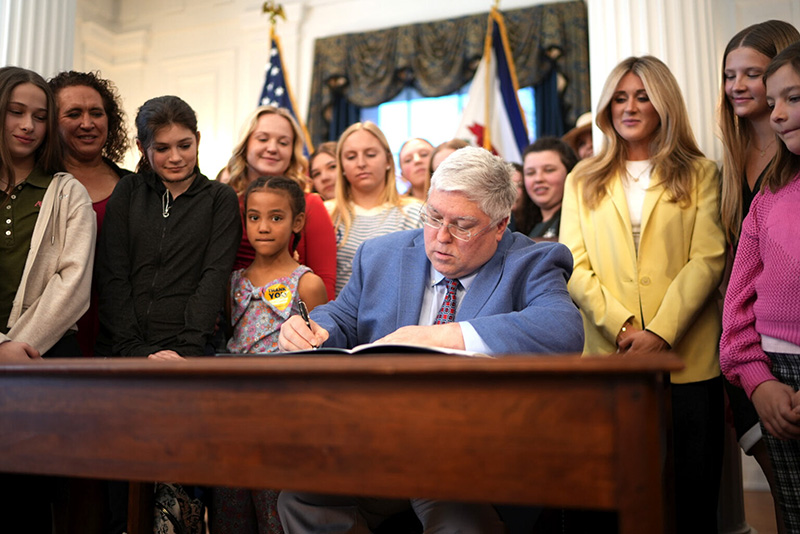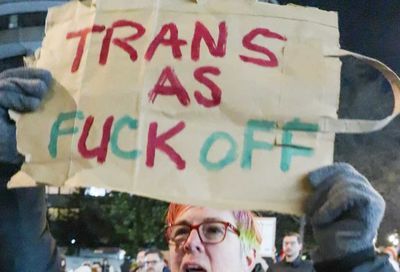Voters in Battleground States Support Marriage Equality, Poll Says
Poll finds a majority of voters in 9 states featuring competitive Senate races prefer candidates who support same-sex marriage.

A recent poll finds that majorities of voters in nine states with competitive U.S. Senate races are more likely to support candidates for Senate who back the Respect for Marriage Act, according to The Hill.
The Respect for Marriage Act, which passed the U.S. House of Representatives with bipartisan support in July, would codify into federal law the right to enter into same-sex and interracial marriages, and ensure the federal government recognizes those marriages as valid.
The TargetPoint poll, conducted in August, focused on voters in Alaska, Indiana, Iowa, Missouri, North Carolina, Utah, Wisconsin, West Virginia and Wyoming. It found more than half of voters in each state supported same-sex marriage, with more than 70% in Utah and Wisconsin agreeing that national marriage equality should continue.
TargetPoint shared its data exclusively with Changing America, a subsection of The Hill focused on joint responsibility. Some information about the poll’s sample size, margin of error and other specifics was not publicly available, though The Hill said “thousands” of interviews with registered voters were conducted for the poll.
TargetPoint has previously done work on the campaigns of former President George W. Bush and Senators Mitt Romney (R-Utah) and Mitch McConnell (R-Ky.), according to its website. TargetPoint currently has a B/C grade from polling analysis website FiveThirtyEight.
A Human Rights Campaign poll, also conducted in August, similarly found that almost two-thirds of likely voters in battleground states supported a law protecting the national right to same-sex marriage.
Like the TargetPoint poll, the HRC poll spoke to voters in North Carolina and Wisconsin, but diverged in the nine other states it included: Arizona, Colorado, Florida, Georgia, Michigan, New Hampshire, Nevada, Ohio and Pennsylvania.
Other recent polls have also found high support for same-sex marriage: Navigator found 61% of polled likely voters in the U.S. supported same-sex marriage, while a Gallup survey published in June found 71% of Americans did so.
Same-sex marriage is currently legal throughout the United States, courtesy of the 2015 Supreme Court case Obergefell v. Hodges, which struck down existing state-level bans on same-sex marriage as unconstitutional. However, the court’s decision in Dobbs v. Jackson Women’s Health Organization this past June, which overturned the 1973 Roe v. Wade decision guaranteeing a federal right to obtain an abortion, may have established a new precedent that could be used to overturn Obergefell and other cases dealing with bodily, sexual, and marital privacy.
In a concurring opinion, Supreme Court Justice Clarence Thomas specifically named the Obergefell case as one of several decisions that the court should revisit and consider reversing, on the grounds that marriage has generally been decided on a state-by-state basis and that the right to marriage is not explicitly mentioned in the U.S. Constitution.
Following the Dobbs decision, the Democratic-led U.S. House of Representatives passed the Respect for Marriage Act, arguing it was necessary to enshrine the practice into law rather than leave it to be decided based on the whims of the six Republican-appointed judges — most of whom have LGBTQ-hostile records on other issues — who currently sit on the court.
However, the Respect for Marriage Act has since stalled in the Senate, in part because supporters haven’t confirmed they have the votes of at least 10 Republican senators to vote for cloture, which would allow the bill to receive a final up-or-down vote. A bipartisan group of five senators has been rewriting language around protections for people who oppose same-sex marriage on a religious basis in order to sway more Republican senators to support the bill, and more than 400 prominent Republicans have urged their fellow party members to back the measure.
However, Senate Majority Leader Chuck Schumer (D-N.Y.) announced last month that a vote on the Respect for Marriage Act would be delayed until after the November midterm elections, in the hope that the extended time and decreased scrutiny will give potential Republican “yes” votes enough cover to consider backing the bill when it comes up for a vote in the upper chamber.
Support Metro Weekly’s Journalism
These are challenging times for news organizations. And yet it’s crucial we stay active and provide vital resources and information to both our local readers and the world. So won’t you please take a moment and consider supporting Metro Weekly with a membership? For as little as $5 a month, you can help ensure Metro Weekly magazine and MetroWeekly.com remain free, viable resources as we provide the best, most diverse, culturally-resonant LGBTQ coverage in both the D.C. region and around the world. Memberships come with exclusive perks and discounts, your own personal digital delivery of each week’s magazine (and an archive), access to our Member's Lounge when it launches this fall, and exclusive members-only items like Metro Weekly Membership Mugs and Tote Bags! Check out all our membership levels here and please join us today!

























You must be logged in to post a comment.